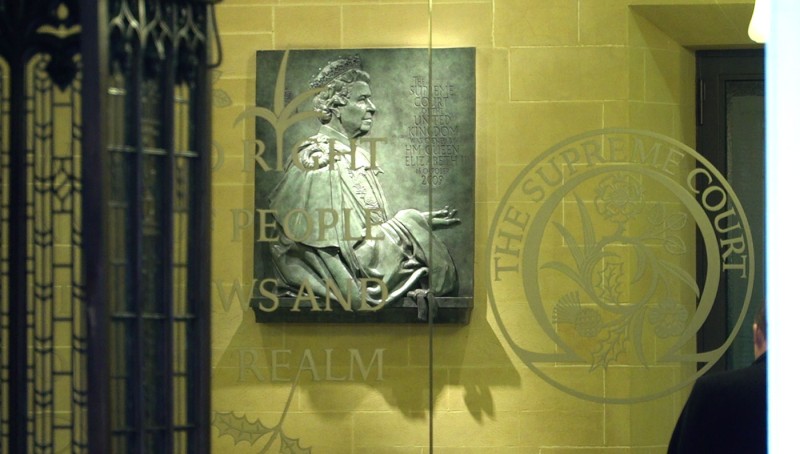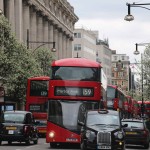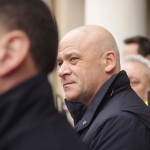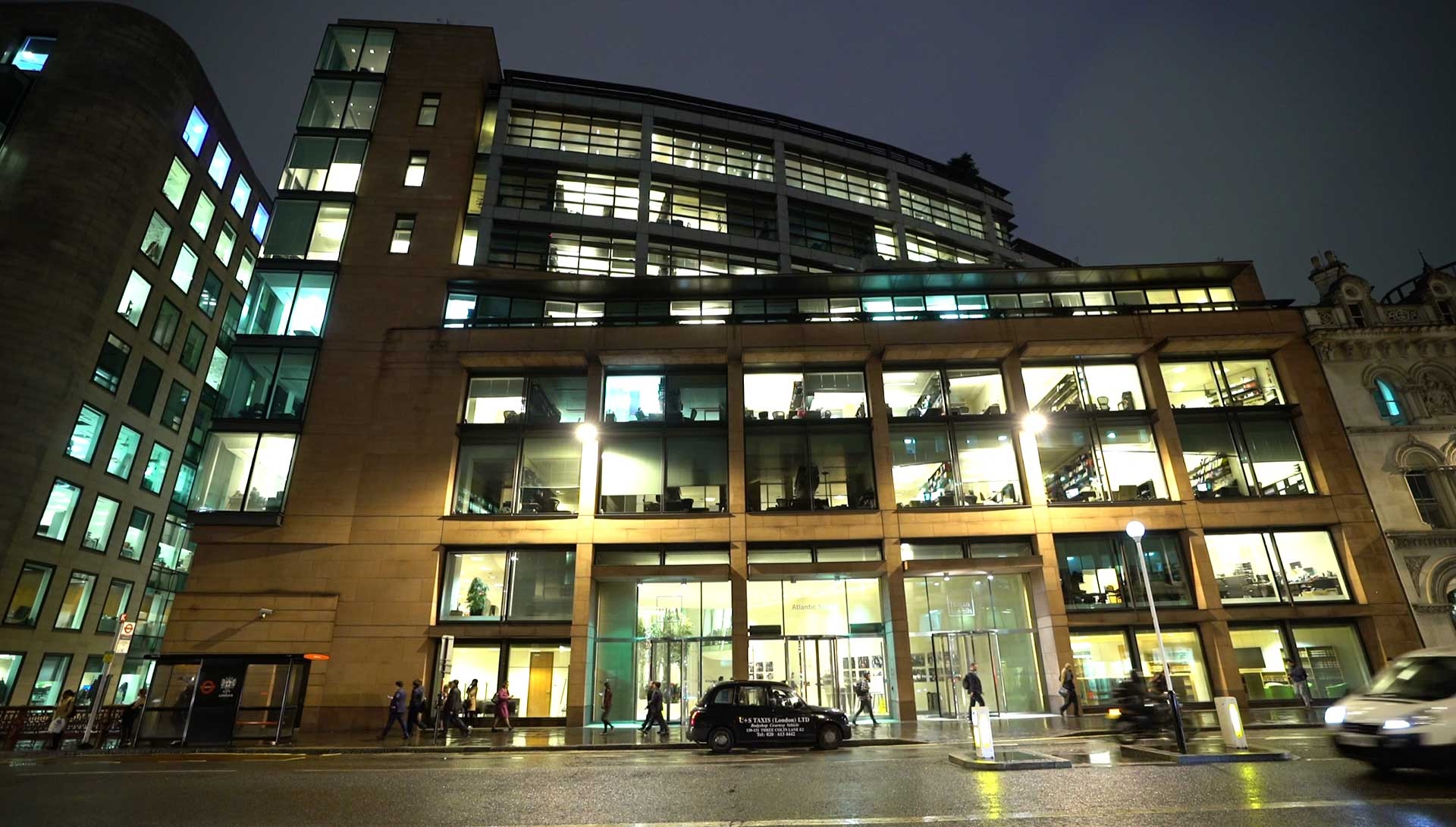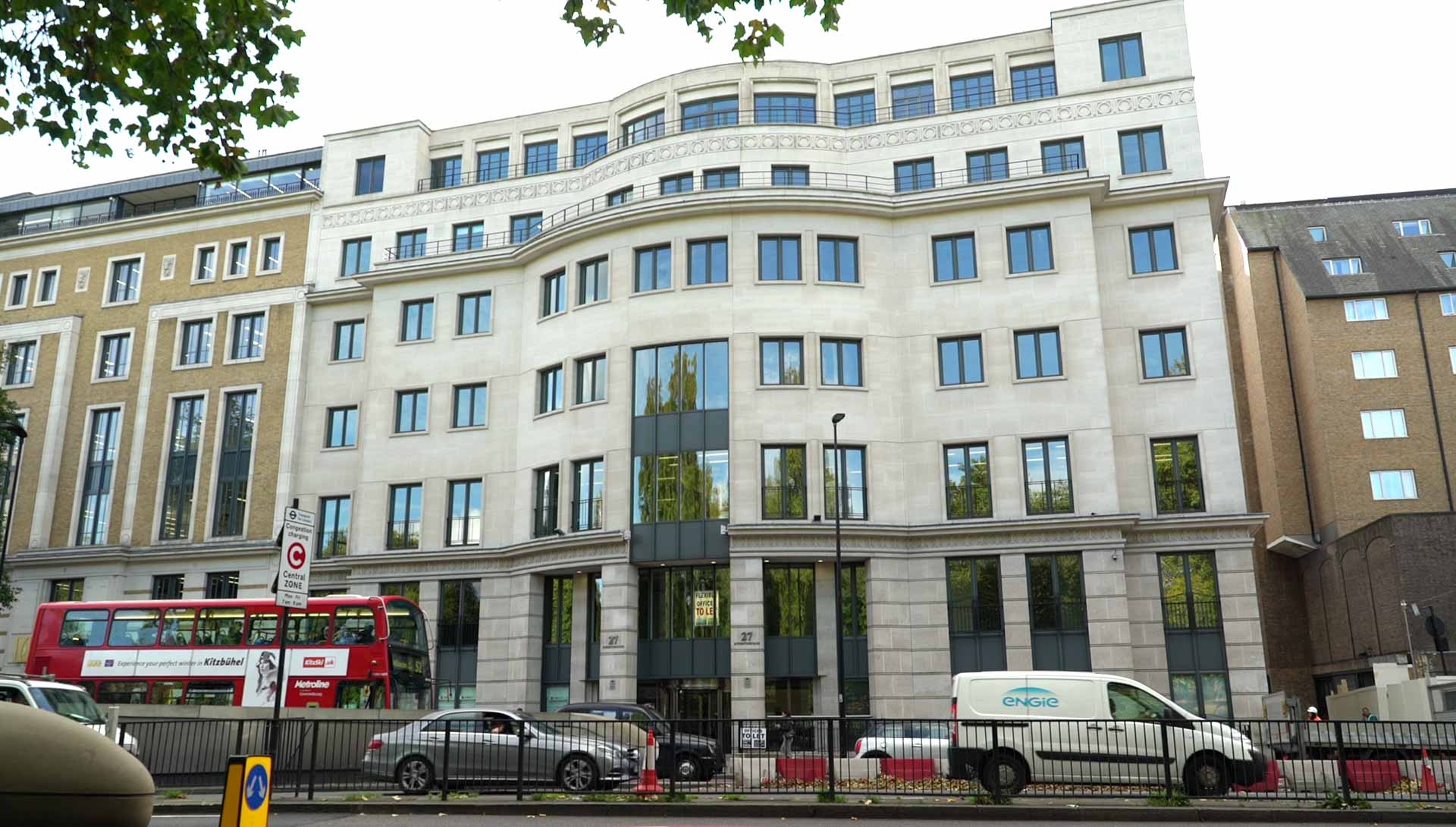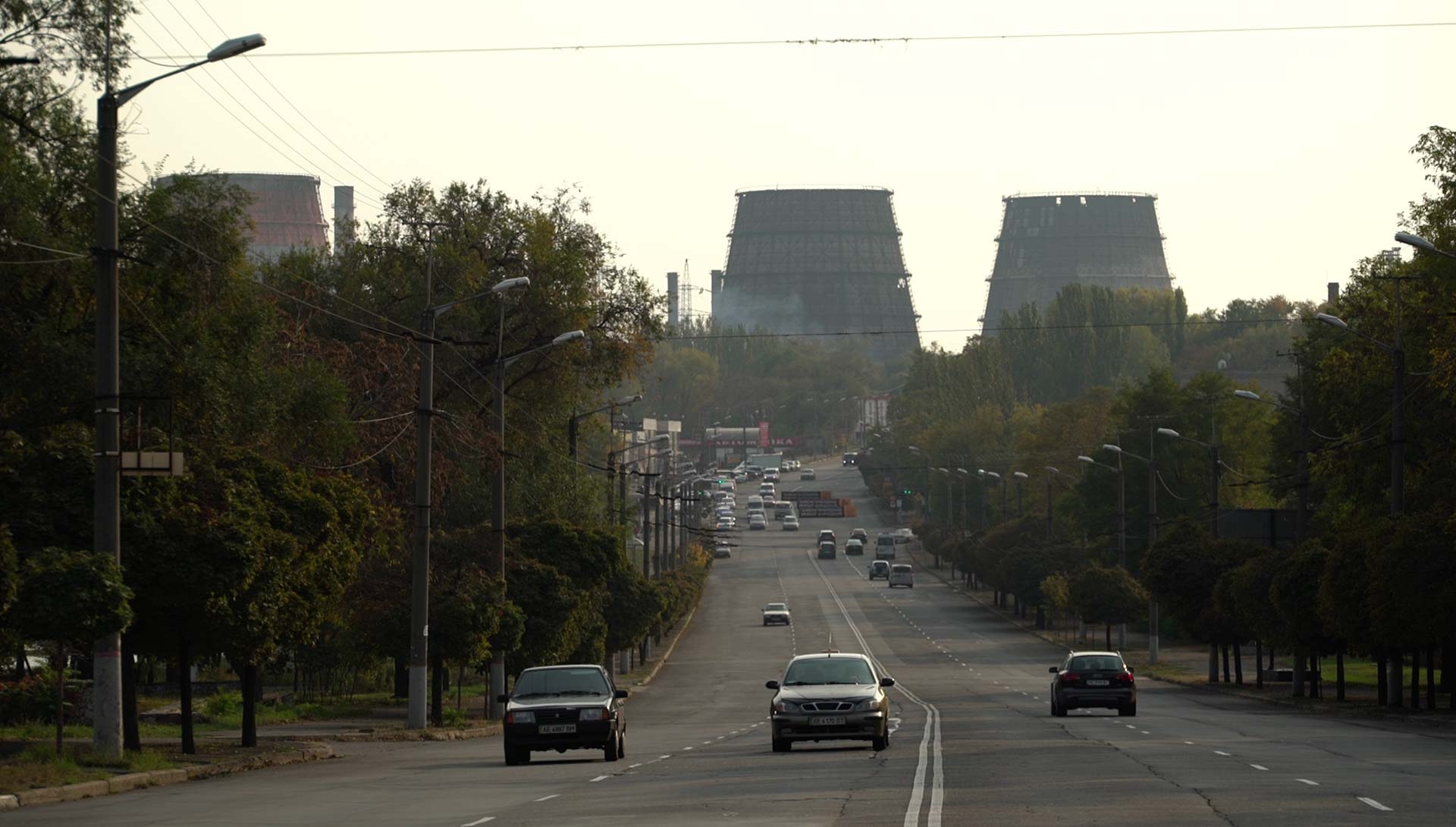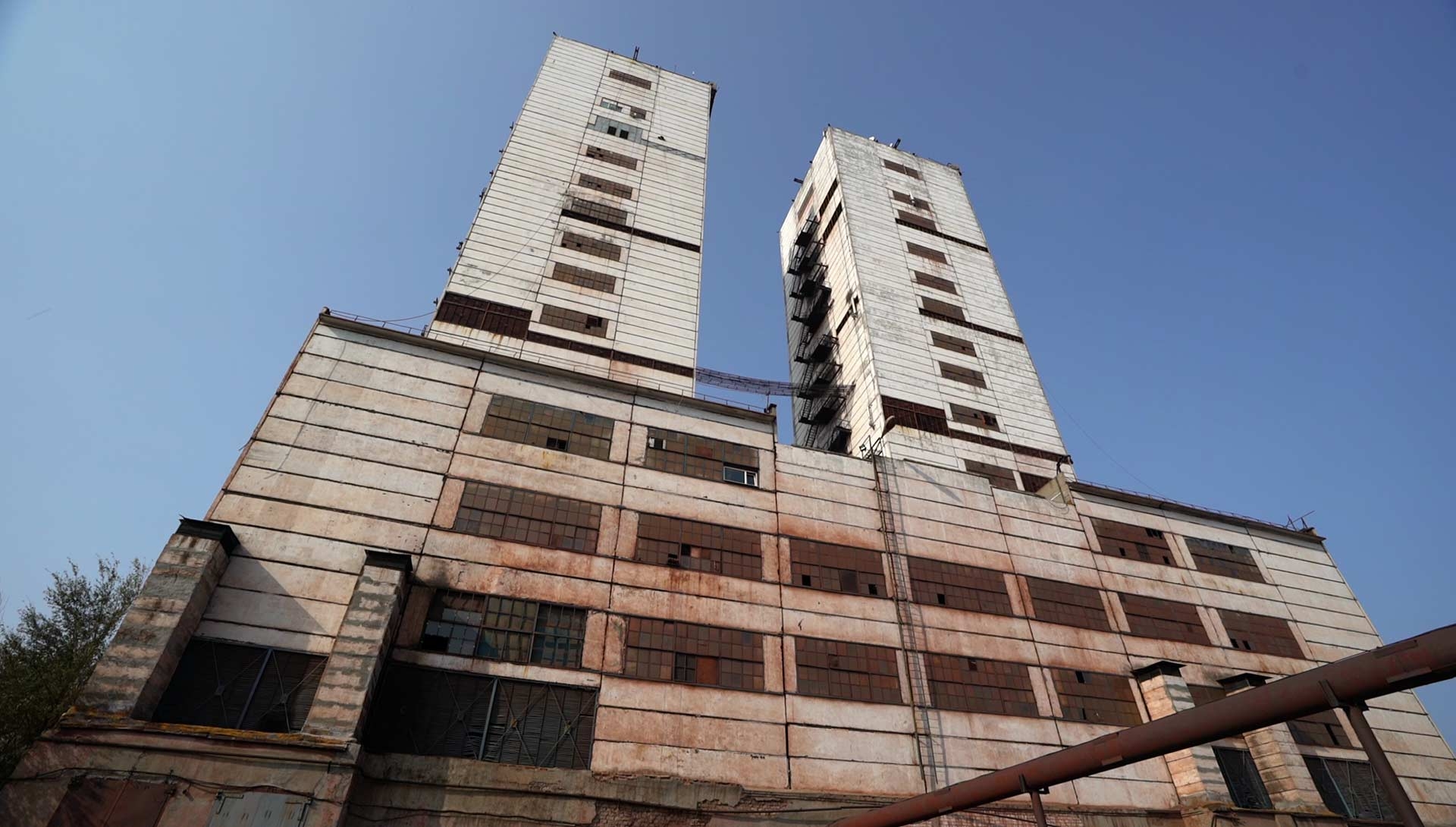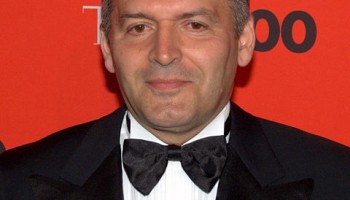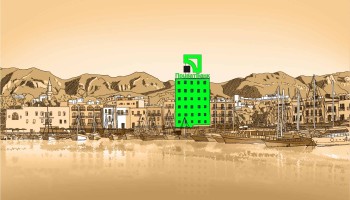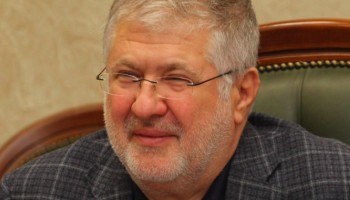Viktor Pinchuk, Igor Kolomoisky, and Gennadiy Bogolyubov are Ukrainian billionaires who made much of their money during the chaotic privatization of state property that followed the collapse of the Soviet Union.
All three hail from Dnipro, an industrial city where their interests have clashed multiple times -- as they did over the Kryvorizkyi Iron Ore Factory, which was privatized in 2004 under disputed circumstances.
In a lawsuit filed years later against Kolomoisky and Bogolyubov in London, Pinchuk claimed that he had paid them for the plant, which they had agreed to buy from the government on his behalf. But in the end, they refused to hand it over. He said he lost $2 billion in the deal.
Filing such suits in London is a standard practice for major Ukrainian businessmen, many of whom trust the British legal system over their own and hold assets in UK-registered firms.
The case was sensational, involving vast sums of money and allegations of beatings and murder on both sides.
But on the eve of trial in early 2016, the parties declared that a settlement had been reached.
The specifics of the deal were never released -- but some can now be revealed. They were buried in the Paradise Papers, a major leak of documents from two offshore services firms based in Bermuda and Singapore, as well as from 19 corporate registries maintained by governments in secret offshore jurisdictions.
The documents were obtained by the Süddeutsche Zeitung and shared with the International Consortium of Investigative Journalists (ICIJ), which organized a collaborative investigation with dozens of outlets across the world, including the Organized Crime and Corruption Reporting Project (OCCRP) and Slidstvo.Info.
A sudden end to a big dispute
The documents reveal that, on Jan. 20, 2016, five days before the trial was to begin, Pinchuk’s lawyers from the London-based Hogan Lovells approached Appleby, a global law firm headquartered in Bermuda.
Philip Beswick, a senior legal assistant at Hogan Lovells, wrote to Appleby’s Simon Cain on a matter that he said demanded urgent attention.
“We act for Mr Pinchuk who is currently engaged in a dispute with Mssrs Bogolyubov & Kolomoisky,” he wrote. “A conditional settlement of that dispute is on the table, whereby Mssrs Bogolyubov & Kolom[oisky] will make a series of staged future payments to Mr Punchuk [sic] over the course of several years.”
The lawyer said the settlement would be secured by bank accounts set up in the Isle of Man. These would be backed by a number of Cyprus companies and Bogolyubov himself. The information that the accounts would in fact be domiciled in the Isle of Man “was only shared with us late last night – hence our coming to you in a hurry,” Beswick wrote.
Appleby sprang into action. Two hours later, the firm’s employees responded that opening accounts in the Isle of Man would be possible without too much paperwork. They asked Pinchuk’s lawyers which bank would be used for the money transfer, and were told it would be Barclay’s, or perhaps some other.
This meant that funds for a Ukrainian enterprise, divided among Ukrainian businessmen, would bypass Ukraine and its tax inspectors. Moreover, they would also bypass England, since all payments would be made through bank accounts in offshore tax havens.
Two days later, Beswick got another email from Appleby's Cain, estimating that the work would cost between £3,000 and £4,000.
Cain also told Pinchuk’s British lawyers that, to save time, Appleby should register the offshore structure under the name of Hogan Lovells to avoid having to run background checks into Pinchuk, “which I imagine will be time consuming and potentially difficult [as] we don’t know him.”
Who are the oligarchs?
In due diligence parlance, Pinchuk was a “politically exposed person,” or PEP, which means that working with him required extra scrutiny. He is the son-in-law of former Ukrainian President Leonid Kuchma, whose decade-long rule of the country was noted for extreme corruption and for the formation of an oligarch class that benefited from poor state management and insider deals.
Pinchuk became very wealthy during this time, amassing a net worth estimated at between $1 and $2 billion. Though he started his career in the early 90s, his businesses really took off after 1998, when he began a relationship with Olena Franchuk, the president’s daughter (the two married in 2002). His empire was built on the privatization of large state-owned factories in the 90s and 2000s.
In addition, between 1998 and 2006, Pinchuk was a member of parliament. He then left politics to focus on his charity foundation, which brings famous international figures, including Tony Blair, to Ukraine to speak at an annual conference. He counts pop start Elton John as a friend and also owns three large Ukrainian TV channels.
The other two businessmen in the dispute, Kolomoisky and Bogolyubov, are controversial figures themselves. The two were recently involved in the collapse of PrivatBank, Ukraine’s largest private bank, which they owned. The collapse left the state with huge losses as it bailed out businesses and individuals who had held accounts there. An investigation by OCCRP revealed that PrivatBank gave out over $1 billion in loans to opaque offshore companies, some of which were linked to the pair or their friends, and were never repaid.
Kolomoisky is also one of Ukraine’s wealthiest men -- according to Forbes, he is worth $1.3 billion. His holdings include large oil and gas companies, Ukrainian International Airlines, the well-known football club Dnipro, and several industrial plants in the Dnipropetrovsk region. He is also an owner of popular national TV channel 1+1.
For a brief period after the Euromaidan revolution, Kolomoisky was named governor of the Dnipropetrovsk region, which borders on the war zone in eastern Ukraine. His support was thought crucial to halting the advance of pro-Russian separatists in the region. But after just one year in the position, he resigned after a scandal involving Ukrnafta, the state oil company.
The Battle of Trafalgar
On Feb. 2, 2016, 10 days after the secret settlement had been concluded among Pinchuk, Kolomoisky and Bogolyubov, Appleby heard from Hogan Lovells again:
“It looks like we will shortly have an additional piece of corporate work on this matter which we would really appreciate your assistance with. As part of the settlement which your current engagement relates to, the other parties agreed to transfer two high-value prime-London commercial properties to Mr Pinchuk.”
The lawyers explained that the properties had already been registered under two offshore firms in the Isle of Man and they would need to be re-registered in Pinchuk’s name. For this, a trust needed to be created on the island of Jersey which would own the Isle of Man firms.
Naomi Hirst is a senior campaigner with Global Witness, an international non-governmental organization that targets corruption. She explains that secrecy would be the primary reason for the creation of such a complicated offshore scheme.
“In the UK it is far too easy to own property through anonymous companies, what we call shell companies, which are companies set up with perhaps the purpose of disguising the true ownership, the true beneficial owner. The Isle of Man [and the island of] Jersey, they do not have public registers of beneficial ownership. So who exactly are the shareholders or directors of these particular companies based in the Isle of Man or Jersey, we don’t know.”
So, she said, “What we see as a general trend is that people who have suspicious or criminal money are quite keen to disguise the fact that it is criminal. So, they will register an anonymous company in a secrecy jurisdiction. This might be the British crown dependencies, such as the Isle of Man or Jersey, it might be Delaware, the British Virgin Islands or Belize. They will establish an anonymous company there, put their money into it, and it is disguised. You can’t trace the money back to them.”
The first of the two valuable properties that Pinchuk received from the other two Ukrainian magnates was an office building at 27-31 Knightsbridge in central London, in the district of Belgravia. Its official owner is a Britain-based firm, Bbay (Knightsbridge) Ltd., that is ultimately controlled by the trust on the island of Jersey.
The building stands across from Hyde Park, down the street from Buckingham Palace. At the end of 2015, it was valued at £75,650,000.
As valuable as the Belgravia building was, Pinchuk’s true trophy was the second property named in the deal. Called the “Grand Buildings” at 1-3 Strand Street in Trafalgar Square, this is an iconic structure that once housed London’s Grand Hotel.
In 1988, the building was renovated and now accommodates offices, expensive restaurants and stores. It sits on Trafalgar Square facing Nelson’s Column, a monument honoring British Admiral Horatio Nelson, who won a dramatic victory against the French and Spanish navies off Spain’s Cape Trafalgar in 1805. The square is one of the city’s major tourist attractions.
After agreeing on the offshore property scheme, Pinchuk’s London lawyers told Appleby that the structure was necessary for “tax purposes,” among other reasons.
“Following completion, the client will be taking over the control of the two abovementioned IoM [Isle of Man] companies and will need to continue to administer them in the IoM and also maintain a majority of IoM directors for tax purposes,” David Harrison of Hogan Lovells told Appleby.
Nick Mathiason is one of the co-founders of Finance Uncovered, a group of investigators that work to uncover money-laundering schemes in the UK. In a small office on the top floor of an old building in London, he and his colleagues are studying how such real estate “investments” enter the British economy.
He explains that the wealthy Ukrainians’ arrangement of holding London property through offshore companies is not exactly unusual.
“There are now 40,000 properties held in London that are offshore ... That’s worth billions and billions of pounds that we have seen invested from all over the world. It is the same with offices as well, in the center of London. It is immensely valuable,” says Mathiason.
The reason, again, is secrecy.
“Potentially, you can save taxes and also, crucially, you can hide your identity,” Mathiason explains. “You don’t have to show to the world that you own this building. You can hide behind an offshore company. That also presents difficulties for enforcement agencies around the world, if they want to understand who owns properties. If they are looking to investigate money-launderers, corrupt people, offshore is really, really a good way to hide from those authorities.”
A long way from the high life
The object of the wealthy businessmen's dispute seems a world away from London.
The city of Kryvyi Rih is located on the steppes, or flat grasslands, of central Ukraine. While Kryvyi Rih spreads out for over 120 kilometers, it is more a collection of worker communities than a traditional city.
Each community has grown up around its own company: a factory, a mine, or a quarry. Ukraine’s largest iron ore deposits are in this region, hence the red-colored dust on the roads and puddles of red water.
In the 2000s, Ukraine’s oligarchs scooped up state assets, often at knockdown prices, during that decade’s privatizations -- ending up splitting the last remnants of the Soviet industrial empire between them. Since then, the businessmen have been among the world’s wealthiest, while the workers of Kryvyi Rih live in relative poverty.
The Kryvorizkyi Iron Ore Factory, the center of the dispute in London, incorporates four mines and nearly 600 million tons of iron ore deposits, which must be extracted from the ground before most is exported to the Czech Republic, Slovakia and Romania.
Oleksandr Potapenko, a miner at the factory, meets journalists in the center of Kryvyi Rih and takes them to his home on the outskirts. En route, Potapenko complains about salaries workers there receive.
“My friend went to Poland,” he says, “The salary [here] was not enough for him, a salary of 8,000 [hryvnia, about $300 per month]. And this is a miner who works at a depth of 1,345 meters and does heavy physical work.”
“Now, [in Poland],” he says, “he works at a coal mine. He is pleased, he says. He earns $300-$400 for two or three shifts.”
Privatizations, revolutions, and uprisings
In 2004, Leonid Kuchma, then the president of Ukraine, signed a law that allowed the 10 most valuable enterprises in the country’s extraction and metallurgy industry -- once part of the state-owned holding Ukrrudprom, -- to be sold for far less than their true value. Pinchuk, Kuchma’s son-in-law, was rapidly amassing the profitable business assets that would make him a billionaire.
But, though the Kryvorizkyi factory was one of the privatized enterprises, Pinchuk didn’t come to own it directly. Instead -- he later alleged -- he had agreed with two other influential billionaires, Kolomoisky and Bogolyubov, that they would buy it from the government on his behalf possibly because it would raise questions if a Kuchma’s family was purchasing the property well under its true value.
But that same year, as the Orange Revolution exploded in Ukraine and Kuchma left office, his son-in-law’s influence shrank significantly.
So, as Pinchuk later alleged in London, when the time came for Kolomoisky and Bogolyubov to hand over the promised factory, they tricked him into buying a worthless offshore firm for $143 million. The company, called Across, in reality held no assets, and the factory remained with Kolomoisky and Bogolyubov, neither of whom spend much time in Ukraine. Kolomoisky lives in Geneva, while Bogolyubov lives in London, as does Pinchuk.
This was the origin of the London dispute between the powerful businessmen -- now apparently settled through the exchange of money and properties via offshore channels.
Back in Ukraine, after the Euromaidan uprising three years ago, a special commission was created in the Ukrainian parliament to investigate the privatizations of the 2000s. The commission concluded that Ukraine’s insiders had bought the extraction and metallurgical companies for almost nothing.
Parliamentarian Pavlo Rizanenko, who served on the commission, was blunt. “If we look at the real value of the assets of the holding Ukrrudprom, in 2005, it amounted to about $20 billion. And this entire holding was purchased for as little as $400 million, due to the artificially limited competition.”
“One of these companies, the Kryvorizkyi Iron Ore Factory, was bought from the state by Kolomoisky’s companies for $40 million, although its real value was over $1 billion,” he said, adding that as a result of the commission’s work the Prosecutor General’s Office has begun investigating whether the privatizations had been legal.
Two witnesses who may have been important to the prosecution were Mykhaylo Chechetov and Valentyna Semeniuk.
In 2004, Chechetov headed the State Property Fund of Ukraine, a government agency that managed the sale of state companies. At that time, Semeniuk headed the parliamentary commission on privatization that was in charge of overseeing the fund’s operations.
Neither Chechetov nor Semeniuk are available to give explanations, however.
Three years ago, Semeniuk was found dead in her house, supposedly having shot herself in the head, although police doubted it was suicide. An investigation carried out by Slidstvo.Info journalists found the evidence pointed to murder.
Seven months after Semeniuk’s death, Chechetov jumped out of a high-rise window, according to law enforcement. That leaves the businessmen themselves as the only key witnesses from the era of questionable privatizations.
No money for the workers
Potapenko, the miner, talks about an attempted strike at the factory. “For a long time, we had wanted to go on strike. We demand that the wage be increased, workers’ rights protection be increased, quality materials for work be provided to us.”
“At first, the management listened to us and raised the wages by 20 percent,” he explains. “But in two months, the wages went back to what they were before. They said, ‘that’s it, there is no money, the iron ore is not selling.’ How come is it not selling? We can see that the storehouses are empty, all the iron ore is sold out.”
For Kolomoisky and Bogolyubov, the current co-owners of Kryvorizkyi Iron Ore Factory, the company is a highly valuable asset. It is hardly surprising that they refused to give it up to Pinchuk.
Last year, the factory produced 1.1 billion hryvnias in income from iron ore sales (more than $40 million dollars). And those are the official numbers; the real revenue could be higher, as many transactions in Ukrainian companies are off the books or manipulated.
In last year’s report for stockholders, it said that the export-oriented factory sold iron ore at the 840 hryvnias ($31) per ton. However, the average worldwide price for iron ore in 2016 was nearly twice as high, at $58.4 per ton.
A common practice is for factory owners to sell products to themselves through offshore companies so huge profits can be recorded offshore where they avoid taxes.
Reporters asked Pinchuk, Kolomoisky and Bogolyubov to comment on this data, and why they had created such a sophisticated offshore scheme for owning the real estate.
Kolomoisky declined to comment on anything, citing his obligation to adhere to the confidentiality condition attached to the settlement agreement. Pinchuk’s press secretary gave the same response. Bogolyubov did not respond to requests for comment.
